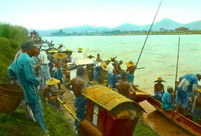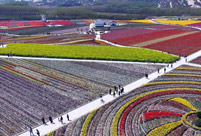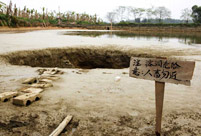

BANGKOK, April 19 -- China has been cooperating with Cambodia, Lao, Myanmar, Thailand, Vietnam and United Nation Office on Drugs and Crime (UNODC) effectively for many years under what is known as the Mekong MOU on drug control, an official from United Nation Office on Drugs and Crime (UNODC) has said.
Prior to the UN General Assembly Special Session on Drugs (UNGASS) to be launched in New York on April 19, Jeremy Douglas, UNODC regional representative for Southeast Asia and the Pacific, praised the development of the Great Mekong Sub-region (GMS) Memorandum of Understanding on Drug Control.
Since its signing in 1993, the MOU has been bringing together six countries of Southeast Asia -- Cambodia, China, Lao PDR, Myanmar, Thailand and Vietnam -- to contain the threat of illicit drug production, trafficking and use in the region and the Sub-regional Action Plan (SAP) is the engine that drives the MOU process.
"The Mekong MOU and SAP have strategies to improve the cooperation and coordination among regional law enforcement, legal, judicial and health authorities, and support sustainable alternative development for poor opium farmers,"Jeremy said on Monday.
As a non-state signatory and the seventh partner to the MOU, the UNODC provides secretariat and technical support to the MOU process, he added.
"China is crucial to the success of the Mekong MOU, providing financial support to the UNODC regional programme so that related activities and capacity building can take place," Jeremy said.
The Mekong MOU also offers China a platform to collaborate with neighbouring states on a multilateral level, he added.
Data show that opium poppy cultivation in the Golden Triangle is the second largest in the world, and opium production is much higher than a decade ago, up to 876 tons in 2015.
Meanwhile in GMS, methamphetamine production and trafficking are expanding as market demand for drugs in the GMS remains high.
He urged China, Mekong states and ASEAN states deepen their cooperation on countering drug production, trafficking and use, suggesting GMS countries' enforcement agencies address the issue through integrated cross border cooperation and real-time sharing of information and intelligence on criminal activities, as well as using UNODC platform for law enforcement training.
"We strongly advise that the cooperation be carefully balanced between law enforcements to counter trafficking of drugs and precursors, health approaches to ensure drug treatment and prevention services are made available at a community level and alternative development programmes for impoverished opium farmers in rural areas are scaled up," Jeremy said.
 The evolution of J-10 fighter
The evolution of J-10 fighter Top 10 Asian beauties in 2016
Top 10 Asian beauties in 2016 What's happening in Xisha Islands?
What's happening in Xisha Islands? When female soldiers meet flowers
When female soldiers meet flowers North Sea Fleet conducts drill in West Pacific Ocean
North Sea Fleet conducts drill in West Pacific Ocean Old photos record the change of Sichuan over a century
Old photos record the change of Sichuan over a century Breathtaking aerial photos of tulip blossoms in C China
Breathtaking aerial photos of tulip blossoms in C China Horrific: Pit swallows 25 tons of fish overnight
Horrific: Pit swallows 25 tons of fish overnight Vietnamese Su-30 fighters fly over Nanwei Island in South China Sea
Vietnamese Su-30 fighters fly over Nanwei Island in South China Sea Top 20 hottest women in the world in 2014
Top 20 hottest women in the world in 2014 Top 10 hardest languages to learn
Top 10 hardest languages to learn 10 Chinese female stars with most beautiful faces
10 Chinese female stars with most beautiful faces China’s Top 10 Unique Bridges, Highways and Roads
China’s Top 10 Unique Bridges, Highways and Roads Arson death video sparks outrage
Arson death video sparks outrage Temple turns itself into a nursing home in fast-aging China
Temple turns itself into a nursing home in fast-aging China Hong Kong Orgasmo Festival to call attention to erotic art and sex
Hong Kong Orgasmo Festival to call attention to erotic art and sex Female expats share their thoughts on violence against women following a recent attack
Female expats share their thoughts on violence against women following a recent attackDay|Week